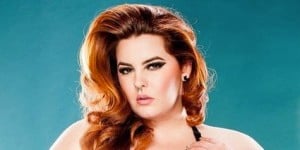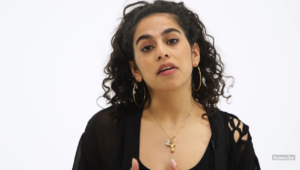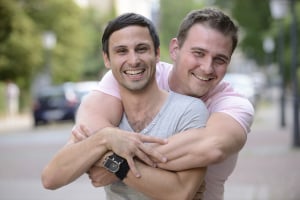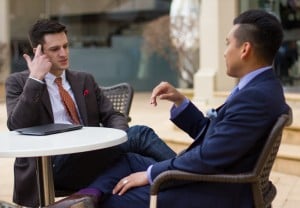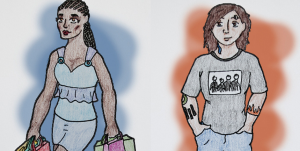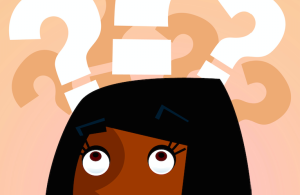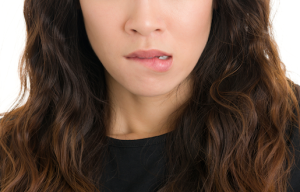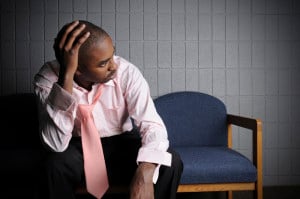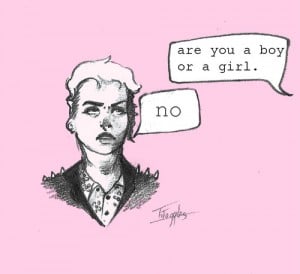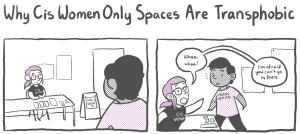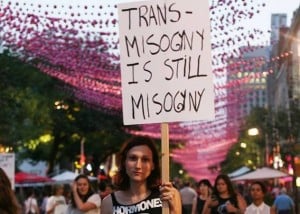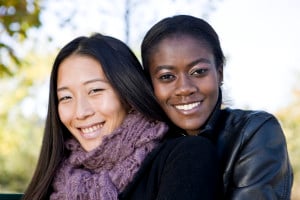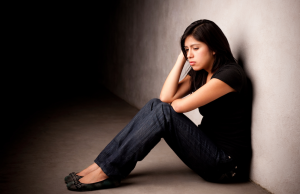Calvin: Say it. Black lives matter. It’s okay. We do matter. You don’t matter any less.
Text: Why are we still talking about racism? Because racism looks like…
Danielle: To me, what racism looks like is calling to see an apartment and turning on my phone voice, and showing up at said apartment, and getting excuses as to why it’s no longer for rent.
Bilal: Every cop car that drives by me, my blood pressure rises. There’s an automatic fear that grips me.
Calvin: It looks like being told, generation after generation, what it means to survive in a black body.
Marisa: When you look at movies, and TV shows, and whatever, you still have the choice black character or the choice brown character, who’s head-snapping or whatever, that’s still a caricature of what blackness is or isn’t.
Kijani: When you walk down the street, people are afraid of you, and you get so used to it sometimes that you even miss it, because it’s just so much a part of life.
Sanyika: I don’t know if I’m going to make it home. Any time a police officer goes by, I’m always having to look over my shoulder. It’s that lack of safety.
Rania: I had a boss once say, “Well, you know what, girlfriend, that is not what I did on the weekend, you know?” I kept thinking like do you really talk to everybody like that? Is that how I speak?
Text: How has racism changed?
Danielle: I don’t think that it’s gotten better. I think that it’s gotten more PC, because people don’t want to be perceived as racist.
Speaker 8: They don’t want to admit it, and they don’t want to be called out on it, and they want to be able to sort of live their lives and sort of get away with it.
Kijani: It messes with my ability to be able to provide for my family.
Amelia: A group of white people might be sitting around talking, and they’ll be talking about black people in a very objectifying or distancing kind of way, like “we” are talking about “them.” I don’t think that they necessarily realize that I’m included in that “them” category.
Ashley: We’re seeing resources pulled from our schools and our school systems where our black and brown kids are being educated allowed to fail. We’re seeing more police in our communities, because we’re thought to be inherently criminal.
Rania: The idea that it took so much to just get a Confederate flag down, a sign of racist intention and behavior. If it was that hard to take that flag down, imagine how hard it is to like eliminate racism and racist ideologies.
Malcolm: Our children’s deaths don’t mean anything. You disrespect our elders. You trample on our traditions. You love everything that we produce, but you don’t love the people who produce it. You know, I don’t know. I don’t know what else to do.
Sanyika: It’s important to really start calling things what they are. As long as things are sugar-coated, we’re not going to be able to address the actual problem.
Danielle: Saying “I’m not racist,” saying “I don’t see race,” none of that really matters unless you’re actively trying to undo those systems. What does that mean? That means utilizing your privilege to create space for people of color to speak for themselves.
Malcolm: In America, black people have to stop looking outward for approval and getting on their knees and begging to be accepted. It’s not going to happen.
Ashley: As long as white people are privileged, as long as white supremacy exists and there is a hierarchy on human life, none of use are free, and black lives don’t matter. To end racism, it’s going to take everyone. It’s going to take all of us.
Speaker 8: You have to like really look at every single institution in this country. How does it manifest racism, and you got to chip away at it.
Calvin: If we could start from that place of recognizing my humanity, our humanity, the beauty of blackness, the embracing of blackness, that might be some radical change, because it’ll require a radical love. Once we’re in that conversation, instead of the one that ignores it, we might be able to move forward.





